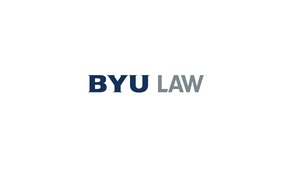Searchable technology interface tool advances understanding of lawmakers' use of language
PROVO, Utah, Aug. 17, 2022 /PRNewswire/ -- BYU Law today announced the addition of the Congressional Record Corpus to its Law and Corpus Linguistics suite of corpora. A pioneering technology tool for the legal community, the Law and Corpus Linguistics Technology Platform enables users to analyze large collections of historical texts called "corpora" for better understanding of context and meaning of words. Although the Congressional Record has been publicly available in a digital format for years, searchability has been limited as most of the record has only been available in a PDF format. Users will now be able to search the full record through BYU's Law and Corpus Linguistics interface, which allows for users to complete a variety of complex searches.
The Congressional Record Corpus (CRC) contains the entirety of the Congressional Record as published from 1873-2021 by the Government Publishing Office. The Congressional Record is a detailed record of legislative history, including bills introduced, transcripts of floor debate and remarks, conference and committee reports, statements by legislators and other proceedings. In total, the CRC contains 4.6 billion words and over 6,000 texts, including data on year and session of Congress.
"While the tools of corpus linguistics are still fairly new, adoption and interest has increased as legal professionals recognize its potential to bring objectivity to interpreting the law, and more corpus linguistics resources become available," said Thomas Lee, retired Utah Supreme Court Justice and visiting BYU Law professor. "The Congressional Record Corpus will allow researchers important insights into legislative registers helping to advance understanding of how language was used by the lawmaking body in the United States at the time a law was passed. Potential applications include legal interpretation, and triangulation with data from other corpora."
BYU Law is a pioneer in the discipline of law and corpus linguistics as the first law school in the United States to offer a course on the topic, the first to host an annual corpus linguistics conference, and the first to develop a dedicated Law and Corpus Linguistics Technology Platform. In 2020, BYU Law released the public version of its law and corpus linguistics platform and search interface, which included the Corpus of Founding Era American English, the Corpus of Early Modern English, and the Corpus of Supreme Court Opinions of the United States. Available at lawcorpus.byu.edu, the database has been used by thousands of researchers, including federal and state justices, and appellate attorneys. The platform enables legal professionals to analyze the meaning of words that can be applied to current cases, with several of the corpora having been referenced in legal opinions, including most recently, when the U.S. Supreme Court held oral arguments in ZF Automotive US, Inc. v. Luxshare, LTD, a case involving the issue of whether a private arbitration panel is covered by the statutory phrase "foreign or international tribunal."
Information on the projects, scholarship, opinions, briefs, and corpus linguistics curriculum is available at https://lcl.byu.edu.
About BYU Law School
Founded in 1971 with its inaugural class in 1973, the J. Reuben Clark Law School (BYU Law) has grown into one of the nation's leading law schools – recognized for innovative research and teaching in social change, transactional design, entrepreneurship, corpus linguistics, criminal justice and religious freedom. The Law School has more than 6,000 alumni serving in communities around the world. In its most recent rankings, National Jurist recognized BYU Law as the #1 best-value law school in its 2021 ranking. For more information, visit https://law.byu.edu.
SOURCE BYU Law

WANT YOUR COMPANY'S NEWS FEATURED ON PRNEWSWIRE.COM?
Newsrooms &
Influencers
Digital Media
Outlets
Journalists
Opted In




Share this article